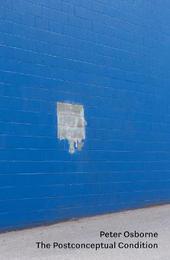
|
The Postconceptual Condition
Hardback
Main Details
| Title |
The Postconceptual Condition
|
| Authors and Contributors |
By (author) Peter Osborne
|
| Physical Properties |
| Format:Hardback | | Pages:236 | | Dimensions(mm): Height 235,Width 156 |
|
| Category/Genre | Theory of art
Art and design styles - from c 1960 to now
Philosophy - aesthetics |
|---|
| ISBN/Barcode |
9781786634900
|
| Classifications | Dewey:709.04075 |
|---|
| Audience | |
|---|
|
Publishing Details |
| Publisher |
Verso Books
|
| Imprint |
Verso Books
|
| Publication Date |
30 January 2018 |
| Publication Country |
United Kingdom
|
Description
If, as Walter Benjamin claimed, "it is the function of artistic form... to make historical content into a philosophical truth" then it is the function of criticism to recover and to complete that truth. Never has this been more necessary or more difficult than with respect to contemporary art. Contemporary art is a point of condensation of a vast array of social and historical forces, economic and political forms and technologies of image production. Contemporary art expresses this condition, Osborne maintains, through its distinctively postconceptual form. These essays-extending the scope and arguments of Osborne's Anywhere or Not at All: Philosophy of Contemporary Art-move from philosophical consideration of the changing temporal conditions of capitalist modernity, via problems of formalism, the politics of art and the changing shape of art institutions, to interpretation and analysis of particular works by Akram Zataari, Xavier Le Roy and Ilya Kabakov, and the postconceptual situation of a crisis-ridden New Music.
Author Biography
Peter Osborne is Professor of Modern European Philosophy and Director of the Centre for Research in Modern European Philosophy (CRMEP), Kingston University London. He is a long-serving member of the editorial collective of Radical Philosophy. His books include The Politics of Time, Anywhere or Not At All, Philosophy in Cultural Theory, Conceptual Art and Marx.
Reviews"The Postconceptual Condition philosophically maps a chasm of truly mythic proportions, namely that between art and politics. While this chasm is quintessentially modern, the meaning of 'modern' keeps changing and with it the structure of historical experience. Global or transnational modernity forces us to revise notions of 'autonomy' or 'activism,' and conditions the work of art in ways that mark a clear break with its modern past, i.e. Conceptualism. In confronting the fate of art institutions (the biennale form) and analyzing the conditions of the artwork proper, Osborne gets a critical grip on that beast that calls the chasm between art and politics home-a creature better known as "the cultural logic of high capitalism." -Roger Buergel, Founding Director of the Johann Jacobs Museum, Zurich "Very little philosophical writing is inspiring enough to catalyse art and bring it into being. Peter Osborne's writing is consistently in this category." -Hito Steyerl, visual artist and author of Duty Free Art
|